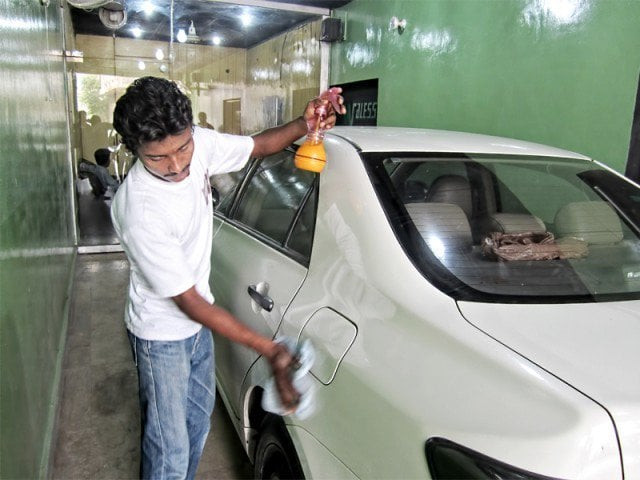Conserving resources: Pindi car service station first to install water recycling plant
WASA officials launch crackdown against stations which have not installed plants

PHOTO: FILE
The plant was set up as the district administration gears up to crack down on some 110 car washes in the city which had failed to respond to the notices and install recycling plants to stop the waste of water.
The crackdown against car service stations is expected to start from today and would see violators shut down.
The water recycling plant was installed at the Khan CNG service station located on the road between Liaquat Bagh and Committee Chowk.
After installing the plant, it was inspected by officials of the Rawalpindi Water and Sanitation Agency (WASA). After observing its operation, they declared the plant as fit.
The owner of the station said that previously, they used around 20 to 30 small tanks of water every day to wash cars. But after installing the recycling plant two days ago, they had managed to lower this to just a single tank of water per day.
The owner added that because the plant recycles the water which they have used to clean a car, they are able to reuse the water again and again.
The upshot of installing the plant, he explained, was that it will help lower their water bill by as much as 80 per cent since they can use a single tankful of water for two to three days instead of requiring multiple tank-fuls of water every day.
WASA Spokesperson Umer Farooq reiterated that service stations which do not have recycling plants will be sealed.
In this regard, he said that the authority had formed teams which will raid car wash facilities during their crackdown.
The Supreme Court had earlier taken notice of falling underground water tables and had directed an inspection of companies which were extracting underground water. During the case, a revised fee for the use of underground water was set.
Separately, State Minister for Climate Change Zartaj Gul Wazir on Thursday disclosed that her ministry had set up the ‘Water Table Regulatory Authority’ to specifically regulate the level of underground water.
WASA to recover water bills
In a bid to enhance its revenues and regulate water usage, the Rawalpindi Water and Sanitation Agency (WASA) has sent notices to some 244 housing societies in the district to pay their water bills.
The agency expects to collect around a billion rupees in dues from these housing societies.
Officials said that some of these housing projects had not paid any water charges for the past 25 years. But now, permission has been granted to regulate them and their use of water.
Rawalpindi Development Authority (RDA) Chairman Arif Abbasi said that soon WASA will granted a bailout package to manage its finances. In this regard, he said that the relevant provincial minister had sent the summary to the Punjab chief minister for approval.
Apart from these unregulated water connections, he said that WASA has also started a crackdown against illegitimate electricity connections across the city. The crackdown will ensure that there is a single bill for a single household, two bills for a two-storey building, while three-storey buildings would get three separate bills according to the new scheme.
Abbasi said that they do not want to hike the water bills, adding that WASA has not increased its waters bills for a decade nor does not want to drop a “water-bomb’ on consumers.
Instead, he said that they are working on the issue of leakage and theft.
However, he said that they may hike water bills after issues of leakages and theft are eliminated.
No leverage will be given to bill defaulters, he said.
Moreover, those who extract their own underground water -- either through tube wells or by digging wells, will also have to pay bills.
Unlike his counterparts in Islamabad, Abbasi refuted the idea that there was a shortage of water in Rawalpindi.
“There is no threat of water shortage in Rawalpindi because the forthcoming rainy season will fill up the Rawal and Khanpur Dams,” he stated confidently.
Referring to WASA’s impending drive against car washes who have not installed recycling plants, he said that the equipment would help save hundreds of gallons of water every day from being wasted.
Published in The Express Tribune, December 15th, 2018.



















COMMENTS
Comments are moderated and generally will be posted if they are on-topic and not abusive.
For more information, please see our Comments FAQ